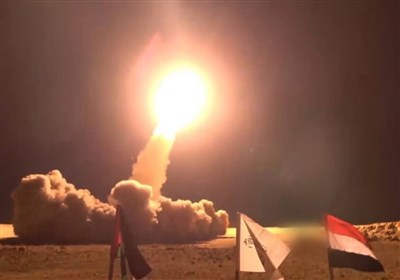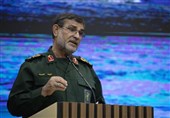Iranian Deputy FM Outlines Results of Arab-OIC Summit in Riyadh
TEHRAN (Tasnim) – Iranian Deputy Foreign Minister Kazem Gharibabadi elaborated on the outcomes of the extraordinary summit of the Arab and Islamic countries, held in Saudi Arabia’s Riyadh.
“Following the escalation of aggressions and crimes by the Zionist regime against the people of Palestine and Lebanon in recent months, and the deteriorating situation in Palestine, especially in Gaza, as well as in Lebanon, the request to hold an emergency summit meeting of the Organization of Islamic Cooperation (OIC) to urgently address the situation in the two regions, and to increase cooperation and synergy among the member states of the organization to condemn the aggressions and crimes perpetrated by the Zionist regime, and to take decisive and practical stances and measures by the Islamic countries to confront the criminal moves by the Zionist regime, has been on the agenda of the Iranian Foreign Ministry for some time,” Gharibabadi said.
“This initiative was first raised in a letter by the Iranian foreign minister to the OIC secretary general and was followed up in a face-to-face meeting with him in New York on the sidelines of this year's United Nations General Assembly (UNGA) meeting. In meetings held during regional trips and established contacts, Seyed Abbas Araqchi also emphasized and followed up on the issue of holding an emergency summit of Islamic leaders. Eventually, Saudi Arabia sent invitations to the heads of Islamic and Arab countries and announced November 11, 2024, as the date for holding a joint emergency summit of Islamic and Arab leaders in Riyadh to follow up on a joint summit held last year in the Saudi capital, Riyadh,” he added.
“Within this framework, and to review and prepare the draft resolution text for the joint emergency summit, the foreign ministerial meeting of Islamic and Arab countries was held on Sunday, November 10, in Riyadh. During the meeting, delegations representing member states discussed the situation on the ground in Palestine and Lebanon in the wake of the Zionist regime's aggressions and the issue of drafting the final resolution for the Islamic and Arab leaders' summit,” the Iranian deputy minister stated.
“The Iranian deputy foreign minister for legal and international affairs led a delegation at the meeting and, during his speech, outlined Iran’s positions, opinions, and proposals on ways to resolve the ongoing crisis in Gaza and Lebanon. The deputy minister acknowledged the collective and individual efforts of the member states but deemed the actions insufficient. He emphasized that the Islamic Republic of Iran expects more effective practical measures to stop the Zionist regime's crimes. During the joint meeting of the foreign ministers of the OIC and the Arab League, the deputy minister recalled the resolutions from the first joint emergency summit of Islamic and Arab states. He called for immediate ceasefire in Palestine and Lebanon, reopening of humanitarian corridors in Gaza, release of all Palestinian prisoners, dignified return of the displaced to their homeland, and the delivery of international aid to begin reconstruction in Gaza. Furthermore, given the Zionist regime's belligerent actions against the legitimacy of the United Nations, including tearing up the UN Charter, declaring the UN secretary general a persona non grata, banning UNRWA activities in the occupied territories, killing hundreds of UN staff, and the complete disregard of the Zionist regime for the provisional orders of the International Court of Justice (ICJ) and violations of the UN Charter, particularly Article 2, he stated that now is the time to expel the Zionist regime from the UN. Other proposals from the Iranian delegation at the ministerial meeting included calling for comprehensive arms, economic, and trade embargos by member states on the Zionist regime and all institutions supporting its occupation in Palestine, expelling the regime from the UN, and reviving the UN Apartheid Committee to examine the regime's crimes,” he went on to say.
“It is worth mentioning that before the foreign ministerial meeting to prepare the final document for the emergency summit, the Islamic Republic submitted its written proposals regarding this document to the OIC Secretariat. Fortunately, a significant portion of the Islamic Republic of Iran's proposals, including the following items, has been included in the draft resolution for the summit,” he said.
He said the draft resolution includes, “Request from the international community to implement all contents of the advisory opinion of the ICJ issued on July 19 regarding ending the occupation, addressing its effects, and paying compensation for the damage caused by the occupation as soon as possible; Request to compel the Israeli regime to respect international law and hold it accountable; Strong condemnation of the Israeli regime for aggression in Gaza, Lebanon, Syria, and targeting civilians; Withdrawal of the regime's forces from the occupied territories and respect for the sovereignty and territorial integrity of Palestine and Lebanon; Request for an immediate ceasefire in Lebanon and Gaza; Request for unimpeded access to humanitarian aid for people in all war-affected areas; Request for all governments to impose an arms embargo and ban on the export or transfer of weapons and ammunition to the Israeli regime; Expulsion or suspension of Israel's membership in the United Nations General Assembly; Condemnation of the Israeli regime's ban on UNRWA activities; Condemnation of the hateful, extremist, and racist moves and statements by Israeli cabinet ministers and a request for the international community to hold them accountable under international law; Request for the release of Palestinian prisoners and detainees; Request for UN member states to impose sanctions on the Israeli regime to compel it to comply with international law and relevant resolutions.”
“In addition, the Iranian delegation registered the reservation of the Islamic Republic of Iran regarding the inclusion of the two-state solution in the resolution,” he added.
“The most important points raised in the text of the resolution approved at the summit include: Condemnation of Israel's brutal aggression against Lebanon and Gaza, emphasis on the need to confront Israel's aggression against Gaza and Lebanon, the necessity to address the humanitarian consequences of the aggression on civilians, children, women, and the elderly, warning about the risk of escalating tensions in the region and its international consequences due to Israel's aggression over the past year and the violation of the sovereignty of Syria and Iran, emphasis on supporting Egypt's and Qatar's efforts to reach an agreement for prisoner exchange and establishing a permanent ceasefire in Gaza, and holding Israel responsible for the failure of the efforts, request from the international community to implement the contents of the advisory opinion of the ICJ dated July 19, 2024, aimed at ending the Israeli occupation of Palestinian territories, condemnation of all Israeli crimes and the request for the Security Council to establish a credible and independent international investigation committee to investigate these crimes, condemnation of the collective punishment policy and exerting pressure on Israel to open passages for humanitarian aid access, request from the international community to take an effective measure to compel the Israeli regime to respect international law, welcoming the September 18 resolution of the General Assembly regarding the advisory opinion of the ICJ, request from all governments and international organizations to adhere to the resolutions concerning the legitimacy of the city of Al-Quds, request from the Security Council to pass a resolution to compel Israel to cease its illegal policies that threaten security and peace in the region, making effort to consolidate international support for the suspension of Israel's membership in the General Assembly and all its subsidiary bodies, request for an arms embargo and halt to weapon transfers to Israel, request from the International Criminal Court (ICC) to issue immediate arrest warrants for Israeli military and government officials for crimes committed against the Palestinian people, strong condemnation of terrorist attacks by settlers against the Palestinian people, request from active international parties to implement a plan to end the occupation and establish an independent Palestinian state, appreciation for countries that recognized the State of Palestine and a request for similar actions by other governments, support for the full membership of the State of Palestine in the United Nations, condemnation of attacks by Israeli officials against the UN, its secretary general, and UNRWA, condemnation of Israel's aggression against Lebanon and violation of its territorial sovereignty, and a request for an immediate ceasefire, request for urgent humanitarian aid to Lebanon, condemnation of Israel's aggression against Syria and the call for an end to the occupation of the Golan Heights.”






